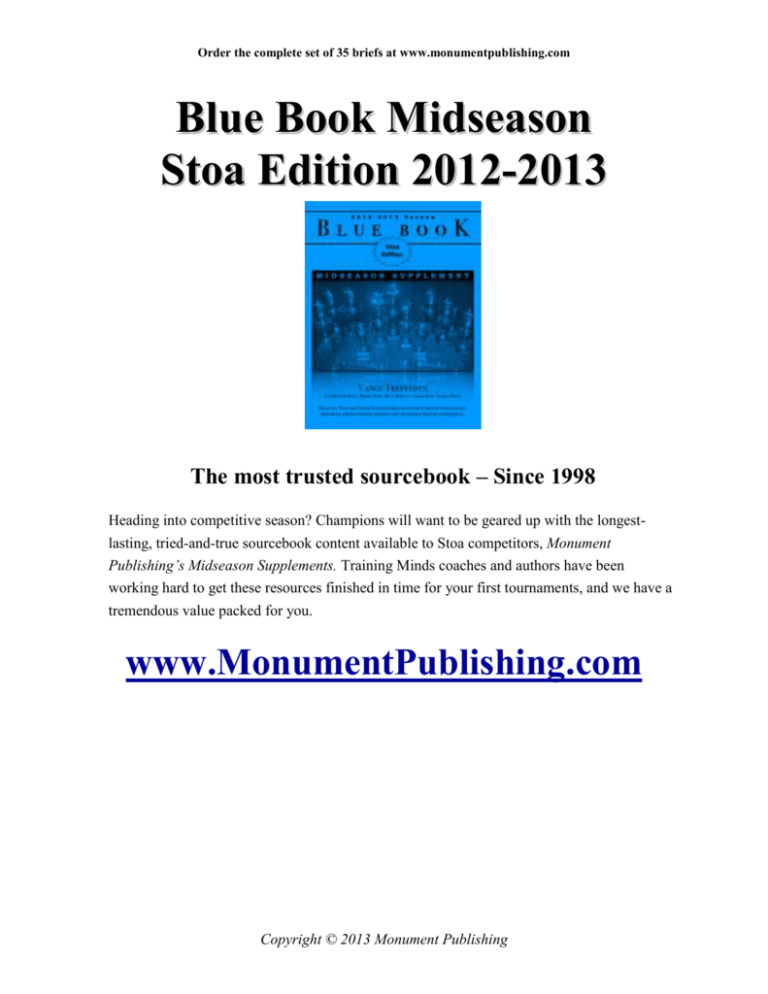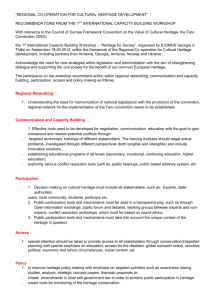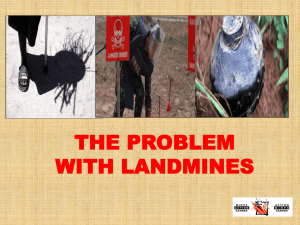Contents - Training Minds Ministry
advertisement

Order the complete set of 35 briefs at www.monumentpublishing.com Blue Book Midseason Stoa Edition 2012-2013 The most trusted sourcebook – Since 1998 Heading into competitive season? Champions will want to be geared up with the longestlasting, tried-and-true sourcebook content available to Stoa competitors, Monument Publishing’s Midseason Supplements. Training Minds coaches and authors have been working hard to get these resources finished in time for your first tournaments, and we have a tremendous value packed for you. www.MonumentPublishing.com Copyright © 2013 Monument Publishing Order the complete set of 35 briefs at www.monumentpublishing.com OTTAWA LAND-MINE TREATY – Bad By Megan McKinley EXTRA-TOPICALITY Standard: The resolution this year asks us to debate “foreign military commitments.” Key word here is “Foreign” Link: The Ottawa Treaty requires actions within the US military inside the United States: Destruction of land mine stockpiles. Arthur L. Rizer III (JD from the Gonzoga University School of Law, 2003), 2012, forthcoming, “Lessons from Iraq and Afghanistan: Is It Time for the United States to Sign the Ottawa Treaty and End the Use of Landmines?” accessed July 19, 2012, http://works.bepress.com/arthur_rizer/1/ (page 16) “To reach this goal the Treaty established that parties may not produce, transfer, and within a four year window, must destroy all landmine stockpiles, keeping only a small supply for the purpose of training in how to detect and disarm landmines.” Violation: Ratifying the land mine treaty would require the US to take actions within the territory of the US, which is extra-topical. Dilemma: Either 1) In order to remain topical, the Affirmative violates the treaty as soon as we sign it, and we don’t destroy land mine stockpiles inside the USA. Or 2) Affirmative team loses on topicality by taking actions outside the resolution that are necessary to achieve the solvency of their plan. Affirmative can lose on Solvency or on Topicality, take your pick. INHERENCY The US has already signed a treaty limiting our use of landmines. Steven Groves and Dr. Theodore R. Bromund 2010 (Steven Groves is Bernard and Barbara Lomas Fellow in the Margaret Thatcher Center for Freedom, a division of the Kathryn and Shelby Cullom Davis Institute for International Studies, at The Heritage Foundation. Ted R. Bromund, Ph.D., is Senior Research Fellow in the Thatcher Center for Freedom at The Heritage Foundation.) December 13, 2010 “The Ottawa Mine Ban Convention: Unacceptable on Substance and Process” THE HERITAGE FOUNDATION http://www.heritage.org/research/reports/2010/12/the-ottawa-mine-ban-convention-unacceptable-onsubstance-and-process The 2004 landmine policy comports with the international obligations undertaken by the United States on the manufacture and use of landmines. Specifically, on March 24, 1995, the United States ratified the Convention on Certain Conventional Weapons[4] and Protocol II, which restricts the use of anti-personnel and anti-vehicle landmines, “booby-traps,” and “other devices.” Protocol II was amended in May 1996 to place additional restrictions on the use of landmines. The United States ratified Amended Protocol II on May 24, 1999. Blue Book Midseason • January 2013 • Stoa Edition Order the complete set of 35 briefs at www.monumentpublishing.com US has big landmine cleanup program CNN quoting State Department spokesman Ian Kelly 2009 (Charley Keyes, CNN Senior Producer) November 24, 2009 “U.S. won't join landmine ban, administration decides” CNN http://articles.cnn.com/2009-11-24/politics/us.landmines_1_landmine-policy-policy-reviewban?_s=PM:POLITICS Kelly said the United States continues to work with governments as well as nongovernmental organizations (NGOs) to help remove landmines."The U.S. is proud to be the world's single largest supporter of humanitarian mine action," Kelly said. "Since 1993 the U.S. has provided more than $1.5 billion worldwide dedicated to building new partnerships with more than 50 post-conflict countries and supporting efforts by dozens of NGOs to promote stability and set the stage for recovery and development through mine clearance and conventional-weapons destruction programs." HARMS The US has banned persistent mines and designed self-destructing mines. Steven Groves and Dr. Theodore R. Bromund 2010 (Steven Groves is Bernard and Barbara Lomas Fellow in the Margaret Thatcher Center for Freedom, a division of the Kathryn and Shelby Cullom Davis Institute for International Studies, at The Heritage Foundation. Ted R. Bromund, Ph.D., is Senior Research Fellow in the Thatcher Center for Freedom at The Heritage Foundation.) December 13, 2010 “The Ottawa Mine Ban Convention: Unacceptable on Substance and Process” THE HERITAGE FOUNDATION http://www.heritage.org/research/reports/2010/12/the-ottawa-mine-ban-convention-unacceptable-onsubstance-and-process U.S. policy is: To use persistent anti-vehicle landmines (i.e., mines that are not designed to self-destruct and self-deactivate) outside the Republic of Korea until the end of 2010 and afterwards only when authorized by the President; To end the use of all persistent mines (anti-vehicle and anti-personnel) everywhere after 2010; To eliminate all undetectable landmines from the U.S. arsenal by February 2005; To begin the destruction of all persistent mines not needed in Korea by February 2006 and ultimately eliminate all persistent mines from the U.S. arsenal; To seek a worldwide ban on the sale or export of persistent mines; and To continue to research and develop new and existing self-destructing and self-deactivating “smart” mines to lessen humanitarian threats, while preserving U.S. military capabilities. In an effort to end the risk to noncombatants from unexploded landmines, the United States successfully developed anti-personnel landmines (APLs) and anti-vehicle landmines that self-destruct and self-deactivate. According to the U.S. Department of Defense, these smart landmines have a 99.99 percent self-destruct reliability rate and are designed to self-deactivate within 120 days with a reliability rate of 99.999 percent by irreversibly exhausting their batteries thereby rendering the mines inoperable. The self-destruction and self-deactivation rates were calculated from proving ground tests involving approximately 67,000 smart landmines. Copyright © 2013 Monument Publishing Order the complete set of 35 briefs at www.monumentpublishing.com DISADVANTAGES 1. Harm National Security Link: Landmines provide protection for US troops. U.S. Department of State 2004 February 27, 2004 “New United States Policy on Landmines: Reducing Humanitarian Risk and Saving Lives of United States Soldiers” Bureau of Political-Military Affairs http://www.fas.org/asmp/campaigns/landmines/FactSheet_NewUSPolicy_2-27-04.htm Landmines still have a valid and essential role protecting United States forces in military operations. Landmines enable a commander to shape the battlefield to his advantage. They deny the enemy freedom to maneuver; enhance effectiveness of other weapons (such as small arms, artillery or combat aircraft); allow us to fight with fewer forces against a larger enemy force; and protect our forces, saving the lives of our men and women in uniform and of those civilians they defend. No other weapon currently exists that provides all the capabilities provided by landmines. Impact 1: Reduce the US’ ability to defend itself and its allies. Steven Groves and Dr. Theodore R. Bromund 2010 (Steven Groves is Bernard and Barbara Lomas Fellow in the Margaret Thatcher Center for Freedom, a division of the Kathryn and Shelby Cullom Davis Institute for International Studies, at The Heritage Foundation. Ted R. Bromund, Ph.D., is Senior Research Fellow in the Thatcher Center for Freedom at The Heritage Foundation.) December 13, 2010 “The Ottawa Mine Ban Convention: Unacceptable on Substance and Process” THE HERITAGE FOUNDATION http://www.heritage.org/research/reports/2010/12/the-ottawa-mine-ban-convention-unacceptable-onsubstance-and-process By announcing a review of U.S. landmine policy, the Obama Administration has reopened the possibility that the U.S. could become a party to the fatally flawed Ottawa Convention, which bans the use of all antipersonnel landmines. Such a ban applied to the U.S. would seriously degrade the ability of the U.S. to defend itself and its allies, particularly in Korea. Furthermore, the very process by which the convention was created is objectionable because it undermines responsible diplomacy and the sovereignty of the United States and other nation-states. The U.S. should shun the Ottawa Convention and the associated process, and instead pursue reasonable arms control through serious diplomacy. Impact 2: Lives of US troops at risk. Steven Groves and Dr. Theodore R. Bromund 2010 (Steven Groves is Bernard and Barbara Lomas Fellow in the Margaret Thatcher Center for Freedom, a division of the Kathryn and Shelby Cullom Davis Institute for International Studies, at The Heritage Foundation. Ted R. Bromund, Ph.D., is Senior Research Fellow in the Thatcher Center for Freedom at The Heritage Foundation.) December 13, 2010 “The Ottawa Mine Ban Convention: Unacceptable on Substance and Process” THE HERITAGE FOUNDATION http://www.heritage.org/research/reports/2010/12/the-ottawa-mine-ban-convention-unacceptable-onsubstance-and-process The current U.S. landmine policy is responsible, and a series of studies—and recent experience—has confirmed that APLs continue to be important weapons that provide crucial tactical advantages to U.S. forces on the battlefield. To sign and ratify the convention would deny these advantages to the U.S. and signal U.S. acceptance of the Ottawa Process. That would be an unwise, even revolutionary, step for lawmakers who value the lives of U.S. forces and the serious conduct of responsible arms control diplomacy by nation-states. Blue Book Midseason • January 2013 • Stoa Edition Order the complete set of 35 briefs at www.monumentpublishing.com 2. Undermine national sovereignty. The Ottawa convention undermines the authority of sovereign states; ratifying the treaty would endorse this flawed process. Steven Groves and Dr. Theodore R. Bromund 2010 (Steven Groves is Bernard and Barbara Lomas Fellow in the Margaret Thatcher Center for Freedom, a division of the Kathryn and Shelby Cullom Davis Institute for International Studies, at The Heritage Foundation. Ted R. Bromund, Ph.D., is Senior Research Fellow in the Thatcher Center for Freedom at The Heritage Foundation.) December 13, 2010 “The Ottawa Mine Ban Convention: Unacceptable on Substance and Process” THE HERITAGE FOUNDATION http://www.heritage.org/research/reports/2010/12/the-ottawa-mine-ban-convention-unacceptable-onsubstance-and-process The military logic for retaining the current U.S. policy is compelling, particularly when compared with the rationale behind the Ottawa Convention, which was created by a process that was avowedly intended to undermine the authority of sovereign, democratic nation-states in favor of unaccountable nongovernmental organizations (NGOs). As a result, the Ottawa Convention mistakes moral fervor for verifiable commitments; dismisses time-tested lessons of arms control, thereby creating perverse incentives; and assumes that responsible nations, such as the U.S., should reduce their security by joining the convention to induce irresponsible nations to join. Link: The Ottawa process was flawed. Steven Groves and Dr. Theodore R. Bromund 2010 (Steven Groves is Bernard and Barbara Lomas Fellow in the Margaret Thatcher Center for Freedom, a division of the Kathryn and Shelby Cullom Davis Institute for International Studies, at The Heritage Foundation. Ted R. Bromund, Ph.D., is Senior Research Fellow in the Thatcher Center for Freedom at The Heritage Foundation.) December 13, 2010 “The Ottawa Mine Ban Convention: Unacceptable on Substance and Process” THE HERITAGE FOUNDATION http://www.heritage.org/research/reports/2010/12/the-ottawa-mine-ban-convention-unacceptable-onsubstance-and-process The convention, which entered into force in 1999, was not the result of traditional diplomatic processes. It was the result of a short, sharp crusade by a large number of NGOs and a few states. Most of these states were small, and none of them were major players in international security. The NGOs were dissatisfied by the pace of progress in the Convention on Certain Conventional Weapons (CCW) and believed that its goal of merely limiting the use of APLs was too narrow. The NGOs wanted a complete, rapid ban. To achieve this, they sought to usurp the role of nation-states in the diplomatic process. They worked by applying relentless public pressure and by claiming to speak for the people of the world and therefore asserting an independent—and higher—claim to moral authority than any national government. Link: The Ottawa Convention is flawed, degrades state sovereignty, and is unenforceable. Steven Groves and Dr. Theodore R. Bromund 2010 (Steven Groves is Bernard and Barbara Lomas Fellow in the Margaret Thatcher Center for Freedom, a division of the Kathryn and Shelby Cullom Davis Institute for International Studies, at The Heritage Foundation. Ted R. Bromund, Ph.D., is Senior Research Fellow in the Thatcher Center for Freedom at The Heritage Foundation.) December 13, 2010 “The Ottawa Mine Ban Convention: Unacceptable on Substance and Process” THE HERITAGE FOUNDATION http://www.heritage.org/research/reports/2010/12/the-ottawa-mine-ban-convention-unacceptable-onsubstance-and-process The Ottawa Convention and the process that created it are both flawed and dangerous. The Ottawa Process was based on the denigration of state sovereignty and the elevation of unelected and unaccountable NGOs to a central role in arms control diplomacy. No U.S. Administration has endorsed this process. The convention that resulted from the process is an unverifiable, unenforceable, all-or-nothing exercise in moral suasion that has frequently been breached in practice and is not a serious diplomatic instrument. Copyright © 2013 Monument Publishing Order the complete set of 35 briefs at www.monumentpublishing.com Impacts: 1) promotes flawed treaty processes that reduce arms control effectiveness; 2) blocks efforts at genuine arms control; 3) harms US security. Steven Groves and Dr. Theodore R. Bromund 2010 (Steven Groves is Bernard and Barbara Lomas Fellow in the Margaret Thatcher Center for Freedom, a division of the Kathryn and Shelby Cullom Davis Institute for International Studies, at The Heritage Foundation. Ted R. Bromund, Ph.D., is Senior Research Fellow in the Thatcher Center for Freedom at The Heritage Foundation.) December 13, 2010 “The Ottawa Mine Ban Convention: Unacceptable on Substance and Process” THE HERITAGE FOUNDATION http://www.heritage.org/research/reports/2010/12/the-ottawa-mine-ban-convention-unacceptable-onsubstance-and-process If the United States joined the Ottawa Convention, it would not only accede to the convention’s onerous and unreasonable obligations, but also sanction and endorse the process that created it. That process is objectionable in part because it is inherently flawed. By substituting moral fervor for careful diplomacy, it creates broad, rushed, and unsatisfactory treaties. This is clearly bad for arms control because it mistakes the signature on a treaty for the reality of arms control. It therefore gives bad actors an institution behind which they can hide and discourages good actors with legitimate concerns from negotiating treaties that impose genuine controls, but that are compatible with their concerns. It is also bad for U.S. security, because it creates an illusion of effective arms control and increases pressure to abandon weapons that the U.S. uses responsibly to secure its vital interests and those of its allies. Blue Book Midseason • January 2013 • Stoa Edition Order the complete set of 35 briefs at www.monumentpublishing.com This was an exclusive midseason brief. There are 36 briefs in the Midseason Supplement. Table of Contents: 1. Anti-Americanism – No Impact, No Solution 2. Arms Races – Not a Problem 3. Atsugi Naval Air Facility – Better Not Shut It Down 4. CEJA – Civilian Extraterritorial Jurisdiction Act 5. China Bad – Big Threat 6. China Good – No Threat, Confrontation Won’t Work 7. CNV-73 (USS George Washington) 8. Defense Budget Cuts – Bad 9. Defense Budget Cuts – No Problem 10. Deficit Spending Disad 11. Drug War – Good 12. Hegemony – Bad 13. Hegemony – Good 14. Human Rights Criterion – Not Needed / Won’t Work 15. US Intervention – Bad 16. Intervention – Good 17. Iran – Big Threat 18. Iran – No Threat 19. Israel – Doesn’t Need More US Support 20. Japan Military Alliance / Presence – Good 21. Military Base Closures – Bad 22. Nuclear Proliferation – Bad 23. Nuclear Proliferation – Not a Problem 24. Nuclear Terrorism – Not a Problem 25. Okinawa – Essential 26. Piracy 27. Pre-emption Doctrine – Not a Problem 28. Private Military Contractors (PMC) – Bad 29. Private Military Contractors – Good 30. PTSD Purple Heart – Not Needed, Won’t Work, May Backfire 31. Soft Power – Bad 32. Space Weapons / Outer Space Treaty 33. Start Treaty – Good 34. Taiwan Support – Good 35. Terrorism – Not a Threat www.MonumentPublishing.com Copyright © 2013 Monument Publishing








